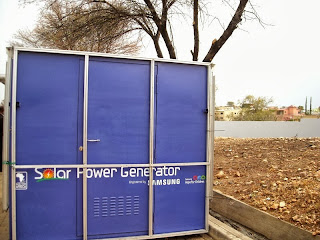Samsung
Africa launched its first Solar Powered Internet School (SPIS) in Botswana a year ago. It was a world first,
designed for use in remote rural areas with limited or no access to
electricity. On average, less than 25% of rural areas on the African continent
benefit from electricity. Isolated and remote communities are left with limited
access to education and connectivity, both of which are key to fast-tracking
education. Samsung has combined its ‘Built for Africa’ products to offer a
workable solution.
On Wednesday, 25 September 2013, Samsung Namibia country manager, Theo Senekal, donated the first Solar Powered Internet School (SPIS) and solar power generator (SPG) to the Ministry of Education of Namibia. The event was attended by Permanent Secretary of Education, Mr. Alfred Ilukena, the Director of Technology of Education, Mr. Johan van Wyk, heads of the Ministry of Education directorates from the various regions in Namibia, Samsung Namibia senior representatives and members of the media.
(Photograph: Samsung Namibia country manager, Theo Senekal, and Permanent Secretary of Education, Mr. Alfred Ilukena)
In his speech, Theo Senekal, expounded on the dedication of Samsung to improve the lives of young Africans: 'In accordance with its belief that business can
prosper only when the society within which it operates remains healthy, Samsung
Electronics maintains a wide range of CSR (corporate social responsibility) activities in order to help build a
better society for all. Most notably, Samsung has been carrying out its Hope
for Children campaign across the globe since 2011, to provide the youth with opportunities
for better health and education through information technology.'
(Photograph: Inside the Solar Powered Internet School, fans, solar-powered notebooks, desks and adequate lighting)
Senekal continued to say, 'In Africa and Namibia specifically, Samsung continues to
look after the health, well-being and education of the youth and today’s
hand-over is an example of that. It is with great pleasure that we today hand-over
the Solar Powered Internet School (SPIS) and the solar power generator to the Ministry
of Education in Namibia.'
(Photograph: The Solar Powered Internet School with flexible solar panels, from a different angle)
Samsung embraced the difficulties experienced daily in Namibia, and utilised solar power, in abundant supply locally, to address 3 key problems encountered by rural communities: access to electricity, internet and quality education. The SPIS is equipped with flexible solar panels, it can be transported to various rural locations in Namibia by road, equipped with a fully-interactive internet classroom, granting both rural teachers and learners access to first-class education assistance.
Said Senekal: 'The use of the SPIS goes beyond the traditional school
classroom use as it can be used as follows, as an adult education centre, Government remote office, community centre, research centre because SPISs
are designed to bridge the digital divide in rural areas and allows for equal
opportunities for all students, both rural and urban. It (SPIS) is
designed to meet the needs of communities that lack access to electricity and
infrastructure, is able to operate anywhere as long as there is sunlight to charge the solar
system, GSM or satellite connectivity and is
built on the basis of a 40 ft container which is easily transportable via road,
rail and sea.
(Photograph: Solar Power Generator, Built for Africa, Hope for Children)
In addition to the SPIS (Solar Powered Internet School), Samsung Namibia also donated a solar power generator (SPG). The solar generator
is the equivalent of a 15KVA diesel generator with a silent pack.
It can run for 24
hours a day and the batteries will last for a minimum of 7 years. If compared to a diesel generator, it requires very little maintenance and will yield its return on
investment in about 2.5 years. In practical terms the SPG can power an equivalent
of 4 houses running the following appliances: 1 × Samsung TV for 8 hours a day, 1 x Samsung fridge for 24 hours a day, 20 x 4 watts Samsung LED lights, running 8 hours a day.
(Photograph: Samsung country manager, Theo Senekal; Director of Technology, Ministry of Education, Johan van Wyk; Samsung regional manager, Aldo Strappazzon)
Since its founding in 1969, Samsung Electronics
has grown into a global information technology leader, managing more than 200
subsidiaries around the world.
Event organised by: Carmen Maartens (Sindana Communications)





lovely, but how we get in touch with them to promote such a project in Nigeria, because am also involve in expanding the reach of I.C.T here in Nigeria as an indigenous company such a project we dont mind partnering with them by providing professional man power service.
ReplyDelete